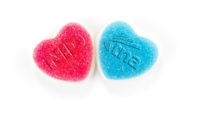Supporters of the University of Wisconsin-Madison’s Resident Course in Confectionery Technology — known colloquially as “Candy School” — are asking the confectionery industry for help in purchasing table-top equipment for future in-person instruction.
Patrick Huffman, a confectionery industry veteran and a 1972 graduate of Candy School, has created a GoFundMe with the goal of sourcing $24,000 to cover the cost of a pilot-size hard candy line from Loynds, a UK-based equipment manufacturer.
Huffman is joined by Dr. Richard Hartel, University of Wisconsin-Madison (UWM) food engineering professor, and Randy Hofberger, long-time educator and current coordinator of the Confectionery Education Advisory Board, in the fundraising campaign.
UWM has fronted a down payment for the equipment, but the remaining balance is needed before the equipment ships in June. As of Wednesday morning, $7,018 had been raised.
Huffman said Candy School has been using equipment donated by participating candy companies for years, but space and the age of the machinery have become concerns.
“Those donated pieces have been great,” he said. “The only issue is that space is always at a premium, and donated equipment can be larger than lab or table-top size. The Candy School lab space is always well filled when instructors, students, materials, and equipment are together.”
Huffman added that table-top equipment, which is often as expensive as full-size production models, will offer students a more interactive experience.
“Having the ability for several groups to work on equipment separately gives a greater ‘hands-on’ experience, so small, lab-size equipment can enhance the school’s value to students,” he said. “We will not replace any equipment that is useful to important experiments, but if some smaller pieces can replace some larger ones, classroom lab exercises can become more personal, and having some free space always helps.”
Launched in 1963 by the National Confectioners Association, Candy School is designed to instruct technical, production, research and managerial personnel in the field of confectionery technology. More than 1,200 students from around the world have attended Candy School over the last half century.
Offered through UWM's Food Science department, the course begins with the chemical and functional interactions of ingredients and advances to more complex subject material including processing, troubleshooting, reworking, and sensory analysis.
“It is very difficult to overstate the tremendous positive impact that Candy School has had on our businesses,” Huffman said. “I often ask industry audience members when I speak to stand if they attended Candy School. In every situation, people are surprised, including some graduates, how many of the audience have been through the program. Developing the basics of our technology for a large and growing audience improves discussion between technologists, confirms a common understanding and language as we help one another, and strengthens our industry’s technical base.”
Hofberger noted Candy School shifted to virtual last year as a result of the COVID-19 pandemic. Featuring prerecorded lectures and labs and live question-and-answer sessions, it offers students more than a month to review and absorb the confectionery knowledge, among other benefits.
"It will also have the advantage of being more cost effective than attending in-person, and it allows those on the waiting list — as long as three years — an opportunity to attend now," Hofberger said.
This year’s Candy School is set to be held virtually July 6-Aug. 5. Registration for the online program is open through July 2.






